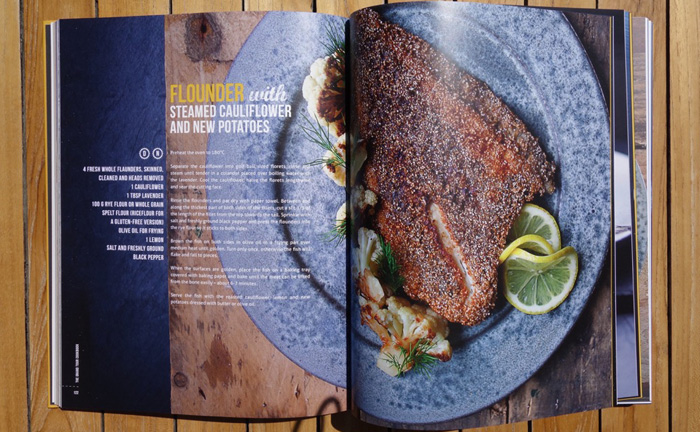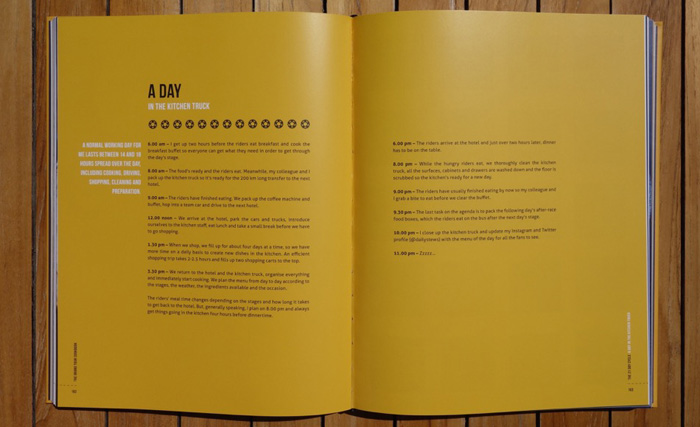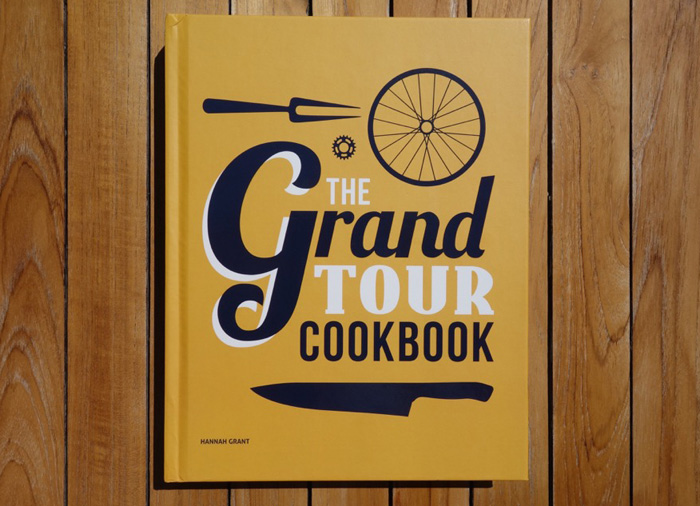The Grand Tour Cookbook by Hannah Grant
Tinkoff-Saxo chef Hannah Grant has published this cookbook with recipes, stories and information.
Food matters for everyone but it’s special in an endurance sport where food means fuel and performance. Only the act of refueling is not the same as filling a truck with diesel, it’s one of the rare social moments in the day for team mates to gather together and talk. It matters whether it’s vitamins and proteins for performance or enjoyment and relaxation around the table. So having a chef on tour for a pro team is a big boost as it means good food, hygienically prepared and served in an attractive way, a big contrast to plates of pasta and salad every day. It’s not new, the first chefs seem to have appeared in the late 1980s with the Dutch PDM team, also the first squad to make regular use of a team bus. This book shows what’s possible when good food and healthy eating are combined.
The book is primarily a list of recipes ranging from soups to salads, meat, fish and desserts, all accompanied by suggestive photos. The recipes are arranged around the idea of 20 stages where each day has a range of suggestions to get you through lunch and dinner but of course you can pick and choose rather than follow the set route. Indeed this is like one of those coffee table books that invites you to flick through the pages until you land on something you’d like to try. It’s full of big photos of the finished product, all taken by Chef Hannah Grant herself.

What works is the simplicity of the food. Because this is for athletes and healthy eaters there’s no need for buttery sauces nor pastries and other components to a dish that can take a long time to prepare and raise the risk of failure. Instead this starts with fresh ingredients and tries to marry them without too much transformation. It’s easy to do and nutritional given cooking denatures precious vitamins. The fresher, the healthier.
Grand tours happen in the summer months and the recipes have a light feel, often using fruit with meat or salads, something that’s refreshing on a hot day. For example couscous with orange and melon.
There’s a big absence of pasta, there’s just one dish among the 340 or so pages and a drastic change from the old days of where pasta confronted the whole peloton for breakfast and dinner. It’s all replaced by the likes of rice, quinoa, couscous, beans, lentils and rice.

There’s more than cooking with two page features such as “a day in the life of a chef” and interviews with various riders too about their preferred pre-race platters: Peter Sagan seems as unfussy as he is on the bike and Michael Valgren is one offering tips on managing weight, the flipside to food for those on career where the watts/kilogram ratio defines so many results.
At the back there are small recipes for sauces to accompany the dishes as well as breakfast recipes, bread and more. The best thing at the back is the index or rather indices. This might be an afterthought to you but it’s got several indices at the back to help look up dishes by the title but also by ingredient and categories like gluten/nut/dairy-free and it’s useful to locate a dish at speed.
So far so good but the negative point to it is the price: it’s £40 roughly $54 or €61 a lot for a book. You do get two kilos of book and good thick paper that has a waxy feel – you can wipe off oil and water spills while cooking – and the feel of something that will last a long time. If you’re tempted then you can try to justify it with claims that the recipe for rice bars will save you a fortune if you use energy foods that cost $/€/£1 a bar.
This copy was sent for review by Musette Publishing and can be bought online at www.hannahgrantcooking.com and US readers can find it on Amazon.com
More book reviews at inrng.com/books


So has this now been translated to English? I’ve been waiting for it!
That is a pretty standard price for a cookbook. I became a chef after stopping racing 20 years ago and have acquired many books over the years, and that would probably be average price. When the French Laundry book first was released in 1999 I paid 120$! Nice work on the blog. Thanks.
Laurie
not sure a Vitamin can be denatured, and most cooking processes are relatively gentle compared to what food goes through once we put inside out bodies.
Vitamin C can quite easily, but I think the general point holds: the longer you cook something, the less of its vitamin content survives.
In biochem, denature is specific to proteins, but it is a valid use of the word outside of that.
Most vitamins are sensitive to heat, which they experience during cooking but no so much in your stomach.
For info, if you click on the picture on the home page you get a message that the page cannot be reached – presumably something wrong with the hyperlinks?
I was seriously tempted, but £40 is too much – I’ll search for it on kindle……
Are there any beef recipes in it?
All my favorite things: riding bikes, cooking, and eating.
Lets not forget the wine.
Does she have wine parings?
Yes of course: champagne always. There’s a small catch though first you must win a stage.
I have been fortunate to attend a presentation by Nigel Mitchell who is the chief nutritionist of Sky. He said that rice is preferable to paste because it has more water (=better hydration) and it helps calm the stomach (=diarrhea prevention). If I recall correctly he mentioned that Sky have a rice steam cooker in the team bus to prepare quick “golden hour” meals.
A lot cheaper but in the same vein is the Feed Zone cookbook by Allen Lim and Biju Thomas (25$) which is great – recipes for portables and great meals. Me and my girlfriend use it quite often. Also some info on training, nutrition, weight control. Levi Leipheimer features heavily but there are no how-to-microdose-EPO stories. Of course the current book is better if you want ‘clean’ cyclistst but who knows what we will learn in 10 years…when this book will probably retail cheaper as well.
Amusing that people find £40 for a specialist cookbook expensive (comparing it to the price of nice bar tape, or a good tyre).
Grant’s book looks very well done, the content is top notch and it would make a thoughful gift for people who enjoy cycling and cooking… cheaper and potentially more useful than those Campag big corkscrews.
+1 for the Feedzone Portables book – I believe all the Leipheimer references can be redacted with a Sharpie if you are easily offended.
The latest issue of Cyclist magazine has a long article on him but no recipes alas! It seems omelettes are very important as well for breakfast. I’ll add a bit more when I’ve finished the mag.
Actually it’s the chef from Trek who’s in the mag.
Sorry for the pedantry but
“all accompanied by suggestive photos”
Is it that kind of book? Much as I love contador, Sagan, majka et all I’m not sure I want to see what they do with a water melon in their spare time
It is indeed, fish suggestively reclining on a plate, soup looking hot in a bowl and more.